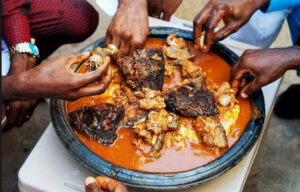Bibiana
May 15, 2025
Blog, Education, Lifestyle

Bibiana
May 15, 2025
Blog, Education, Lifestyle
Eating together in Ghanaian communities has always meant more than just sharing a meal. It is about unity, cultural preservation, friendship and mutual understanding.
Everyone who knows me knows one thing, I don’t joke with food, and I don’t joke with tradition. I remember when I was younger, I would wait all day for my dad to come home so we could eat together. No matter how hungry I was, there was this unspoken rule in my heart, I wouldn’t eat until he got back. And it wasn’t just about the food. It was about being together. Sitting together , one bowl between us, sharing stories, laughter, and silence.
In many Ghanaian homes especially Ashanti households, mealtime was never a solo activity. Everyone gathered, from the youngest to the oldest. We would sit in a circle, the aroma of fresh fufu, abom, eto, or ampesi filling the air, all centered around a single bowl placed before us.
But it wasn’t just about satisfying hunger.
In Ghanaian tradition, especially in Akan communities, the act of eating together is sacred. It symbolizes unity, togetherness, respect, and the very essence of communal living. When we eat together from one bowl, we’re not just sharing food, we’re sharing life.
Children were taught from a very young age:
Don’t reach across someone else’s portion.
The eldest eats first.
Eat from your side of the bowl.
Don’t rush.
And most importantly, don’t let anyone eat alone.
These weren’t just rules, they were values passed on without words:
Patience – You wait your turn.
Discipline – You take only what you need.
Respect – Elders come first.
Humility – You don’t overreach.
Community – We eat together.

Looking back, I realize these weren’t just meal routines, they were lessons in human values. Our elders didn’t need to give lectures about discipline or respect. All they had to do was serve food in one bowl, and everything else followed. In the rhythm of eating together, we were molded into better humans.
Even conflict was resolved during meals. You could be angry at your sibling, but when it was time to eat, all grudges disappeared. That bowl had a way of healing hearts and bonding spirits.
Today, everything has changed.
Fast food culture has crept in. Family dinners have become “grab-what-you-can” moments. Everyone eats when it’s convenient; on their bed, in the car, at the office desk, or with eyes glued to a screen; Netflix and chill.
We’ve traded the warmth of togetherness for the speed of convenience. But what we lose in the process is far greater than we realize:
Food has become individualistic. But it was never meant to be. In our culture, food was always communal.
As someone who tells food stories for a living, I carry the weight of this loss heavily. I’ve seen how quickly our traditional ways are fading. How younger generations now associate food with aesthetics on Instagram rather than with the deep-rooted meanings our ancestors placed on it.
But I believe we can revive this.
Not because it’s trendy.
But because it’s necessary.
Yes, we can. And it starts with small, intentional steps.
Invite a friend over for a shared meal.
Cook with your children and sit down to eat with them from one bowl.
Put your phones aside and let the food do the talking.
Tell your stories. Listen to theirs.
Let the meal become a place of memory, laughter, and healing.
Because food is more than nourishment, it’s how we build bonds, raise children, resolve conflict, and preserve identity.
When we talk about preserving culture, we often think of language, clothing, or music. But food, how we eat is just as important. So the next time you think about a “family meal,” think beyond the food. Ask yourself: who’s around the bowl?
In that one bowl is a universe of tradition, discipline, empathy, and love.
Let us not let go of what makes our meals sacred.
Let’s pass it on.
New in Ghana? Check out these market tips
Copyright © 2023 Cheflifestyle by Teabag Creations. All rights reserved.